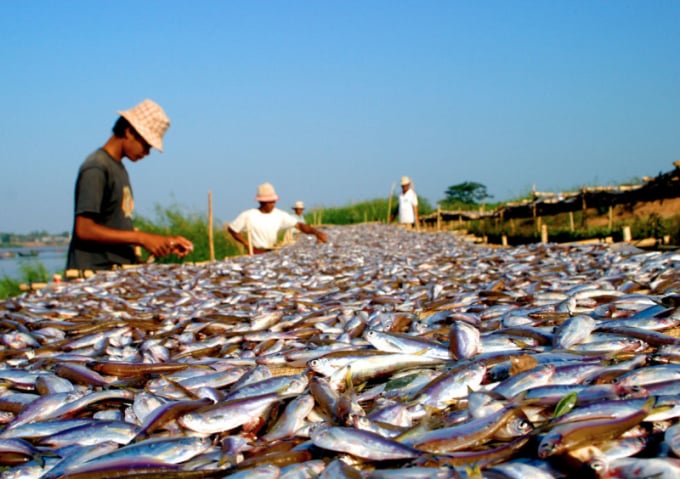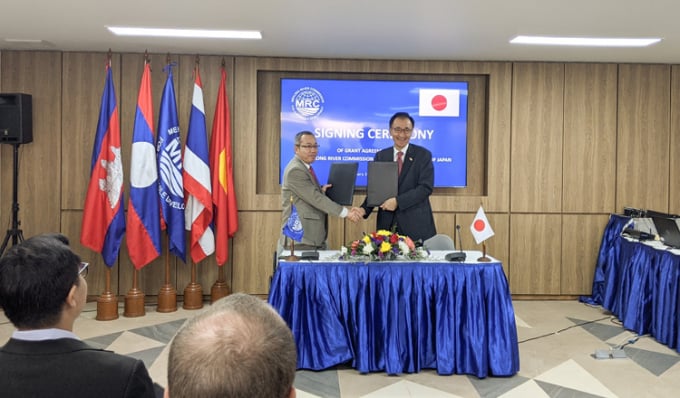June 16, 2025 | 15:39 GMT +7
June 16, 2025 | 15:39 GMT +7
Hotline: 0913.378.918
June 16, 2025 | 15:39 GMT +7
Hotline: 0913.378.918

Small, migratory food fish on drying racks on the shores of the Tonle Sap River, Cambodia. Photo: WFF.
The government of Japan has granted US$ 2.9 million to the Mekong River Commission (MRC) to implement its new strategic plan, seeking to promote responsible development in the region.
“The new funding gets right to the heart of the challenges our region faces and will be facing in the future,” An Pich Hatda, MRC Secretariat chief executive officer said as quoted in Khmer Times.
Spanning four years from 2021 to 2024, the funding is expected to increase the MRC’s and its Member Countries’ – Cambodia, Lao PDR, Thailand and Vietnam – ability to monitor and assess the river environment, and adapt to prevailing changes.
Key activities funded by the grant include improved river monitoring networks and forecasting capabilities, and the establishment of new monitoring stations on the Mekong River.
The grant will also be used to improve public information on flooding and drought through the use of advanced technologies, ensuring local communities and governments receive information in time to implement appropriate mitigation measures.
Last year, Japan granted US$3.9 million to advance the MRC’s flood and drought forecasting systems. As a longstanding development partner of the MRC, Japan has since 2001 granted over US$ 21 million to support flood and drought management, irrigation, climate change, and environmental management.
“This additional funding should enable the MRC to provide more accurate and efficient river monitoring and forecasting services to the public and its Member Countries,” said Mr Keizo Takewaka, Japanese Ambassador to Lao PDR.

Representatives from MRC Secretariat and the Japanese Government are at the signing ceremony held at MRC Secretariat Headquarter in Vientiane on February 26. Photo: Khmer Times.
The Mekong River and its tributaries support nearly 70 million people in the Lower Mekong Basin, providing livelihoods, food security and rich ecosystem services. Countries in the Low Mekong River Basin suffered record low water levels along the Mekong River in 2019 and 2020 and saw livelihoods disrupted.
On February 22, the MRC announced that water had increased slightly over seven days after alarms were raised that the Jinghong hydrological station was adversely affecting water levels, resulting in stretches of the Mekong River to turn brown.
According to the commission, the outflow at the Jinghong station had increased from 786 square cubic metres to 1,020 by February 22.
However, according to the Chinese Ministry of Water Resources, the outflow at the hydro station has consistently remained at no more than 1,000 cubic metres square since January.
The Mekong with a length of about 4,350 km is the longest river in Southeast Asia, the 7th longest in Asia, and the 12th longest in the world.
The river is a life-source to the 60 million people that live within the lower Mekong basin. Aquatic resources such as fish and molluscs account for 80 per cent of the protein in the basin’s household diets, while the fisheries of the Mekong are estimated to be worth more than $2 billion per year.
Representing almost 2 per cent of the combined (freshwater and marine) global fish catch by weight, it is the largest inland fishery in the world, the Khmer Times reported.
The river system is home to great cultural diversity, with more than 95 different ethnic groups living in the Mekong basin. In the lower basin, Khmer, Lao, Thai and Vietnamese people have depended upon the Mekong’s resources for thousands of years and the river forms an integral part of local culture./.
Translated by Bich Huong

(VAN) The working delegation from the Ministry of Agriculture and Environment conducted an important trip to the Netherlands to strengthen strategic partnerships and sustainable development in the agricultural sector.

(VAN) The letter ‘A Plea from the Ocean’ not only evokes emotion but also awakens the human conscience to the responsibility of protecting life on Earth.

(VAN) The Department of Agriculture in South Africa has announced the country’s first mass vaccination of poultry to prevent local birds from contracting avian influenza.

(VAN) Establishment of the Mekong Delta Regional Agricultural Linkage Center, aiming for a closed value chain, deep processing, trading platforms, and international market connectivity.

(VAN) Gia Lai province has recently recorded 460 rare species of animals and plants, contributing to forest conservation and biodiversity planning in the region.

(VAN) Ms. Caroline Beresford, New Zealand Ambassador to Vietnam, expressed confidence that agricultural cooperation between Vietnam and New Zealand will develop sustainably, be climate-resilient, and promote gender equality.

(VAN) Vietnam reaffirms its commitment to international cooperation in fostering sustainable and responsible fisheries while ensuring resilient livelihoods for small-scale fishing communities.